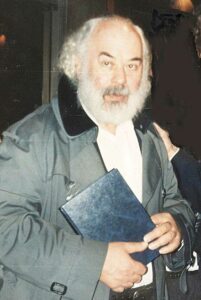
Shlomo Carlebach (January 14, 1925 – October 20, 1994) was the son of Orthodox Rabbi Hartwig Naftali Carlebach of Berlin. Prior to Hitler’s accession to power, the family left Germany for Austria and later for Switzerland. Shlomo, later in life, came to the United States where he briefly served as a Chabad emissary, utilizing his musical talent to attract Jews to the movement. However, Rabbi Menachem Mendel Schneerson, the Rebbe of Chabad, disapproved of his methods and the relationship ended in 1954.
A songwriter who couldn’t read music, Carlebach composed the popular “Am Yisrael Chai” (The People of Israel Live), which is now a Jewish standard, and thousands of other songs. He gained fame as “the singing rabbi” and he founded the Carlebach Shul in New York City’s Upper West Side.
After he died of a heart attack, Lilith Magazine ran an article accusing him of sexual improprieties with female followers. A daughter, Neshama Carlebach, who has followed in his musical footsteps, wrote a letter saying she accepted her father “flaws and all” and is angry at him, but “I refuse to see his faults as the totality of who he was.”
Tomorrow, January 15: Edward Teller
*
SDJW condensation of a Wikipedia article.
I had the opportunity to perform wiht Rabbi Carelbach on his first visit to Poland in 1988. I was working on my film “At the Crossroads: Jews in Eastern Europe Today (with Oren Rudavsky) when we saw him visiting the famous Krakow Jewish Cemetery. He saw me with my violin and said to follow him into the famous REMUH Synagogue. He asked me to take out the violin and listen. The synagogue was packed with people. Every few minutes Rabbi Carlebach asked me if I could hear the strains of the melody. First I didn;t understand what he meant but then I realized he was composing a song at that very moment while being spiritually infused as he stood on the very bima Rabbi Moses Issreles stood and prayed. Slowly I could hear a discernable melody coming from Rabbi Carlebach. An hour later everbody in the shul was singing the “Cracower Nign” which Rabbi Carlebach wrote at that moment. Now the melody is sung all over the world often on erev shabes. That evening I joined the rabbi on stage for his concert in the opera house. Both experiences I will never forget.